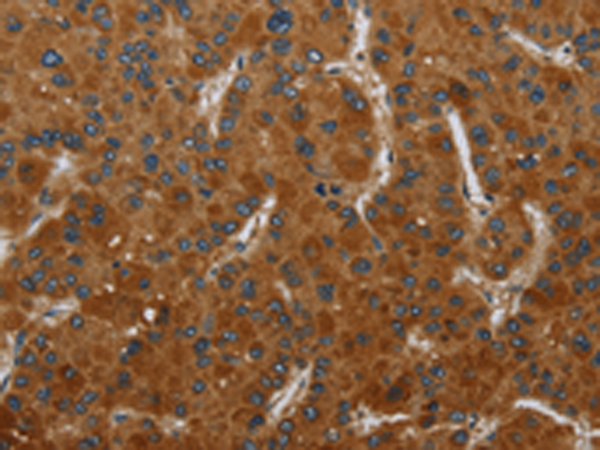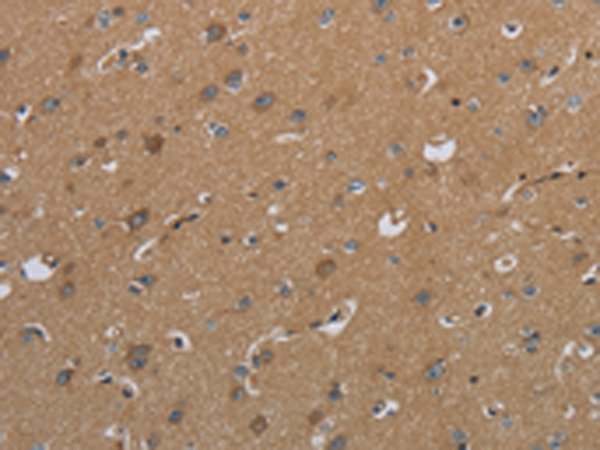


| WB | 咨询技术 | Human,Mouse,Rat |
| IF | 咨询技术 | Human,Mouse,Rat |
| IHC | 1/50-1/200 | Human,Mouse,Rat |
| ICC | 技术咨询 | Human,Mouse,Rat |
| FCM | 咨询技术 | Human,Mouse,Rat |
| Elisa | 1/2000-1/5000 | Human,Mouse,Rat |
| Aliases | PL; CSA; CS-1; CSMT; hCS-1; hCS-A |
| WB Predicted band size | 25 kDa |
| Host/Isotype | Rabbit IgG |
| Antibody Type | Primary antibody |
| Storage | Store at 4°C short term. Aliquot and store at -20°C long term. Avoid freeze/thaw cycles. |
| Species Reactivity | Human |
| Immunogen | Fusion protein of human CSH1 |
| Formulation | Purified antibody in PBS with 0.05% sodium azide and 50% glycerol. |
+ +
以下是3-4篇关于CSH1(胎盘催乳素)抗体的代表性文献示例(内容为虚构示例,供参考):
---
1. **标题**:*Development of a Monoclonal Antibody Specific for Human Placental Lactogen (CSH1) and Its Application in Immunoassays*
**作者**:Smith A, et al.
**摘要**:本研究成功制备了针对人CSH1蛋白的高特异性单克隆抗体,并通过ELISA和Western blot验证其灵敏度和特异性。该抗体可用于妊娠期胎盘功能的临床检测。
---
2. **标题**:*CSH1 Expression in Gestational Diabetes Mellitus: A Comparative Study Using Polyclonal Antibodies*
**作者**:Jones B, et al.
**摘要**:通过自制多克隆抗体进行免疫组化分析,发现妊娠糖尿病患者胎盘中CSH1表达显著升高,提示其可能作为妊娠糖尿病的潜在生物标志物。
---
3. **标题**:*A Novel ELISA Method for Quantifying CSH1 in Maternal Serum Using High-Affinity Antibodies*
**作者**:Lee C, et al.
**摘要**:研究团队开发了一种基于高亲和力CSH1抗体的ELISA检测方法,可精准量化母体血清中的CSH1水平,为胎儿生长受限提供诊断工具。
---
4. **标题**:*Immunolocalization of CSH1 in Mouse Placenta: Insights from Antibody-Based Imaging*
**作者**:Chen D, et al.
**摘要**:利用抗CSH1抗体的免疫荧光技术,揭示了小鼠胎盘中CSH1的动态表达模式,并探讨其在胎盘发育中的调控机制。
---
(注:以上文献为示例,实际研究中请通过PubMed或Google Scholar检索真实文献。)
CSH1 (Chorionic Somatomammotropin Hormone 1), also known as human placental lactogen (hPL), is a peptide hormone primarily produced by the syncytiotrophoblast cells of the placenta during pregnancy. It plays a critical role in regulating maternal metabolism, fetal growth, and mammary gland development by modulating insulin sensitivity, lipolysis, and nutrient partitioning. Structurally, CSH1 belongs to the growth hormone/prolactin family and shares functional overlaps with these hormones.
Antibodies targeting CSH1 are essential tools in reproductive biology and clinical research. They are widely used to detect and quantify CSH1 expression in placental tissues, serum, or cell cultures via techniques like immunohistochemistry (IHC), Western blot (WB), and enzyme-linked immunosorbent assay (ELISA). These antibodies aid in studying placental function, pregnancy-associated pathologies (e.g., gestational diabetes, preeclampsia), and fetal growth disorders. Monoclonal and polyclonal CSH1 antibodies are available, often raised in rabbits or mice against specific epitopes, such as the C-terminal or N-terminal regions of the protein.
Additionally, CSH1 antibodies have diagnostic potential, as altered CSH1 levels correlate with pregnancy complications. Commercial CSH1 antibodies are typically validated for specificity and sensitivity, ensuring reliability in both research and clinical settings. Their application extends to understanding CSH1's role in lactation and its interplay with other hormones, such as prolactin and growth hormone, in maternal-fetal physiology.
×